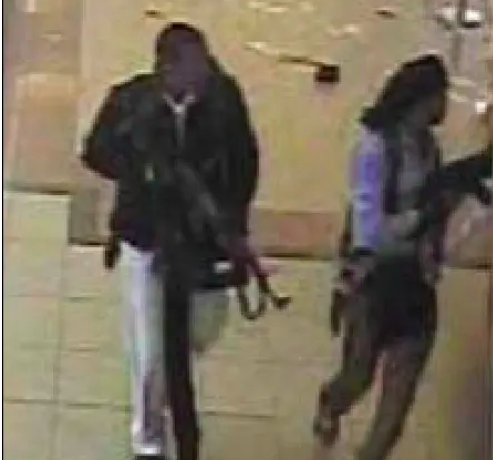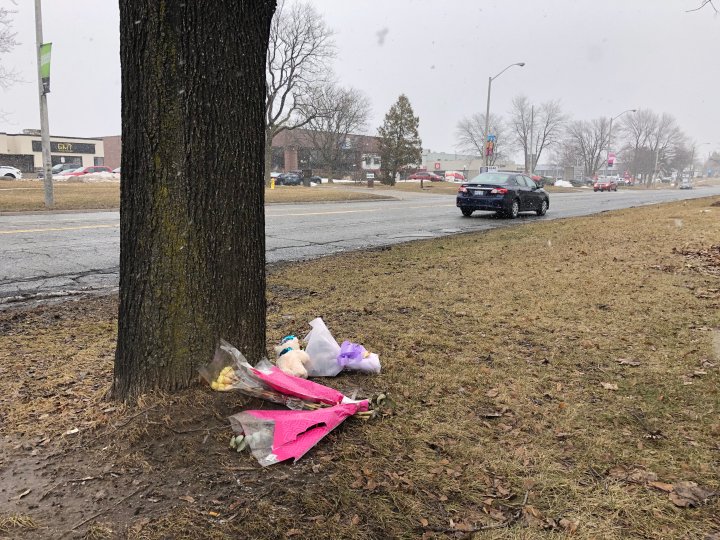

By
Stewart Bell &
Jeff Semple
Global News
Published September 8, 2021
11 min read

Robert Munk and Annemarie Desloges had just ordered burgers and chocolate shakes at a restaurant in Nairobi when they heard explosions on the street.
Then the shooting started.
Two Al-Shabaab gunmen, armed with assault rifles and dressed for war, were firing at the diners seated on the restaurant patio.
Munk and Desloges crawled on their elbows, fleeing the patio to take cover inside.
They lay entwined on the floor. There was glass on Munk’s face, he could taste blood. He told his wife he loved her, and he realized she wasn’t breathing.
“She was the one,” he said. “And then they took it away from us.”
Read Part 1, Part 3 and Part 4 of this series.
Over the past 20 years, dozens of Canadian families have lost loved ones to terrorism. Most died in attacks outside Canada.
A database compiled by Global News shows that at least 75 Canadians were killed in overseas terror attacks during that time, and 32 were injured.
But according to victims of terrorism and victim advocates, far better federal support is needed to help them through the immediate aftermath of attacks, and the long-term trauma and financial impacts.
“It’s just piecemeal, that you find on your own,” said Michel Desloges, Annemarie’s father, of the assistance available for Canadian terror victims and survivors.
He said a national agency was needed to help guide victims following attacks by referring them to mental health and financial support.
“Victims of terrorism, they’re in no state to deal with all this on their own.”
The Desloges were better prepared than most to deal with a crisis abroad. They are a family of diplomats. Michel and his wife Madeleine are both retired foreign service officers who met while serving in the Ivory Coast.
Madeleine has direct experience helping terror victims. When she was a consular officer at the Canadian embassy in Paris, the Algerian Armed Islamic Group bombed a commuter train at Port-Royal station.
A Canadian was among the dead, and her spouse was badly hurt. Madeleine was assigned to help the family.
She found French authorities well-prepared to respond to victims’ needs, and said the Canadian who survived the attack received a lifetime pension from the government of France.
“It was very, very well-organized,” she said. “All the resources were there.”
Seventeen years later, she was the one in need of assistance.
Annemarie was born when her parents were posted to Canada’s embassy in Bogota.
“She was very friendly and outgoing and energetic,” Michel said. “I haven’t met anyone who didn’t like her.”
She also had a keen sense of justice, which prompted her parents to suggest she become an immigration officer or lawyer.
When she was a student, she started working for immigration.
“I guess she just found that it was her way of doing justice. She liked refugees, going to refugee camps. She liked helping people,” Madeleine said.
She moved to the Canadian embassy in Kenya in 2011, working with refugees and overseeing family reunifications, before becoming a liaison officer for the Canada Border Services Agency in Nairobi.
Expat life had its challenges, but Annemarie and Munk remained very much in love after 11 years together.
“She was in every sense of the word, PERFECT,” he wrote.
In April 2013, Annemarie visited Ottawa and spent time with her niece Mia. Her parents saw her off at the airport. They planned to see her again at Christmas, when they would be visiting Nairobi. Annemarie had organized a safari.
She returned to a region that was increasingly unstable due to an Islamist insurgency in Somalia led by Al Shabaab, an Al Qaeda-linked armed extremist faction devoted to “waging war against the enemies of Islam, and removing all foreign forces and Western influence from Somalia.”
The Al Shabaab campaign of bombings, armed assaults and kidnappings was mostly confined to Somalia, but in 2010 suicide bombers struck in the Ugandan capital Kampala, killing 76.
By 2013, Al Shabaab had turned its sights on its neighbour Kenya, which had angered the militants by joining the international coalition battling them in southern Somalia.
Sept. 21, 2013, was a Saturday. Annemarie and Munk had planned a day together: a movie, takeout sushi, and a romantic evening at home with a bottle of wine.
But first, they stopped for lunch at a newly opened burger place at Westgate mall, which had a cinema and was popular among Nairobi’s expats.
They sat outside on the patio and held hands. Munk’s phone rang, his boss interrupting with a question, which made him agitated because he didn’t want to be disturbed on their day together.
At around 12:30 p.m., a silver Mitsubishi Lancer pulled up in front of the mall’s main entrance. Four gunmen got out. They tossed two grenades at the security booth, and a third at a restaurant patio.
When the explosions began, Munk lept across the table, on top of Annemarie. He told her to stay down. He’d heard about grenade attacks in the city. Militants would toss them in public areas and drive off.
But then there was shooting, and Munk said they needed to get inside. He started crawling and Annemarie followed.
She told him she couldn’t see out of her left eye.
The gunmen entered the mall and began firing at the restaurant patrons, executing them. The shots were close, Munk could feel the debris splashing his face as the bullets glanced off the walls and floors.

He thought their only hope was to play dead. He told Annemarie to stay quiet and not to move. He put his lips to her ear and said he loved her. But she was gone and he was ready to die with her.
“Then I started thinking of all the good memories we had, the beautiful life we lived and the happiness I had in her and all who mattered to me,” he wrote.
“Because I did not want these monsters to have the right to take two beautiful lives away with such horror. … They did not deserve that right.”
He was carried to an ambulance, having lost the woman he called his soul mate.
Naguib Damji, a Vancouver businessman, also died in the attack. Global News attempted to contact his family through an intermediary, but received no response.
Madeleine and Michel were driving home from a movie when Munk called. They knew something was wrong because he wanted to talk as soon as they got home.
When he told them there’d been a terrorist attack and Annemarie was dead, Madeleine fell to her knees.
They booked tickets to Nairobi, and spoke to Canada’s foreign affairs and immigration departments, which agreed to cover their costs.
“We knew a lot of people, and everybody wanted to help us, old colleagues or colleagues of Annemarie. So in our trauma, we were very fortunate to get help, which most people wouldn’t get,” Michel said.
The first snag came when they landed in Kenya and were told to pay a landing fee. It was only US$50, but they refused. It felt like a slap to pay for admission to recover their daughter’s remains.
Getting a death certificate from the Kenyans was another challenge. It took weeks.
“But you need that death certificate to get anything done — bank accounts, probates, you name it. You need a death certificate. Nothing moves,” Michel said.
An officer assigned to them by the Canadian high commission, the CBSA and their daughter’s friends helped them.
“We were well taken care of,” Michel said.
Upon their return to Canada, they organized a ceremony in Ottawa.
“And then I broke down,” Michel said.
It hit him hard, and although there were things that needed to be done, he couldn’t focus.
“It’s like having a concussion,” he said. “Everything’s kind of a fog, you can’t concentrate.”
They read books about grieving. Madeleine found a program offered by the Ottawa chapter of Bereaved Families of Ontario.
They also took in their son-in-law, who had recovered from his shrapnel injury but had PTSD and survivor’s guilt.
“The difficulty also when we came back is that we had our own grief to deal with, and we also have Robert with us,” Madeleine said.
“They were difficult months.”
Madeleine tried to find counselling suited to what Munk was going through, but it was a challenge. Eventually, they found someone at Canada’s international development agency.
She also discovered a government program for the spouses of federal employees who had been killed on the job. But that was only a result of her own digging.
To this day, they’re not really sure what support is available for terror victims.
“Every province is different. So where do people go? They don’t know where to go and they’re not in a frame of mind to start looking. It’s very difficult,” Michel said.
“They’ll probably need mental health help. Also, some people may need financial help for the funeral depending on their financial situation. They’ll need psychology help later on, the family as well. But there’s no central place.”
“So what you need is a repository, a central location where people can say, ‘Okay victims of terrorism, you can contact this number or this website or this email and it’s all there.’ So if you come from Ontario or Alberta or B.C., this is what services are available to you and in this city, so that they can put you in touch with resources.”
Although Kenya said it killed the terrorists who staged the attack, two accomplices, Mohamed Ahmed Abdi and Hussein Hassan Mustafa, were convicted last October of helping them.
As their sentencing hearing approached, the U.S. government notified an international network of terrorism victims that families could send impact statements to be entered as evidence in the Kenyan court.
When Susheel Gupta heard about it, he decided to track down the Canadian families to see if they wanted to participate.
Gupta was a 12-year-old in Toronto when his mother was killed in the 1985 Air India bombings. He became a prosecutor and now works for the RCMP, where part of his job involves helping victims. He is also chair of the Canadian Resource Centre for Victims of Crime.
“I did take it upon myself, but I can say that I have the full support of my management and senior officials at the RCMP to see what we could do to reach out to the families and inform them of their rights to enter victim impact statements,” Gupta said.
He found the Desloges family in Ottawa and helped them prepare victim impact statements, which were notarized by Crown prosecutors and sent to Kenya through Canadian diplomatic channels.
“Dealing with counter-terrorism and security is not always just about chasing the bad guys, but it’s also standing up for those victims of terrorism and supporting their rights.”
While the impact statements made it to court in Kenya, the incident underscored that no federal agency takes responsibility for assisting terror victims, or helping them participate in the justice system.
Annemarie’s family still misses her every day. Moments of joy are overshadowed when it hits them that she isn’t there. But they said they were getting used to what Michel called “the new normal.”
A scholarship has now been established in Annemarie’s name at the University of Ottawa. They wanted her to have a legacy.
The Desloges have also been instrumental in plans to build a memorial in Ottawa for Canadians killed while serving abroad.
Every year, around Sept. 21, Madeleine watches Kenyan news video of the attack.
During the footage, Annemarie and Munk can be seen on the floor. The gunmen appear, coldly picking off the unarmed diners.
“I need to have this feeling to be there, with some kind of feeling to know she didn’t suffer or everything went quickly. But I need to see,” she said.
In his three-page impact statement, Munk wrote that he feels he failed his wife.
What if they had caught an earlier movie instead of having lunch first? What if he’d sat facing the street instead of with his back to it?
“Imagine living your life blaming yourself for the death of your wife. I did not kill her, but I could not save her. I hate myself more than I do the killers!”
At night, he still wakes and looks for her in bed.
“My name is Robert Munk and I was Annemarie Desloges husband until 21 September 2013.”
Next: In Part Three of this series, the story of what happened in London, Ont., after a driver rammed a Muslim family in what prosecutors have called an act of terrorism.
Stewart.Bell@globalnews.ca





Comments